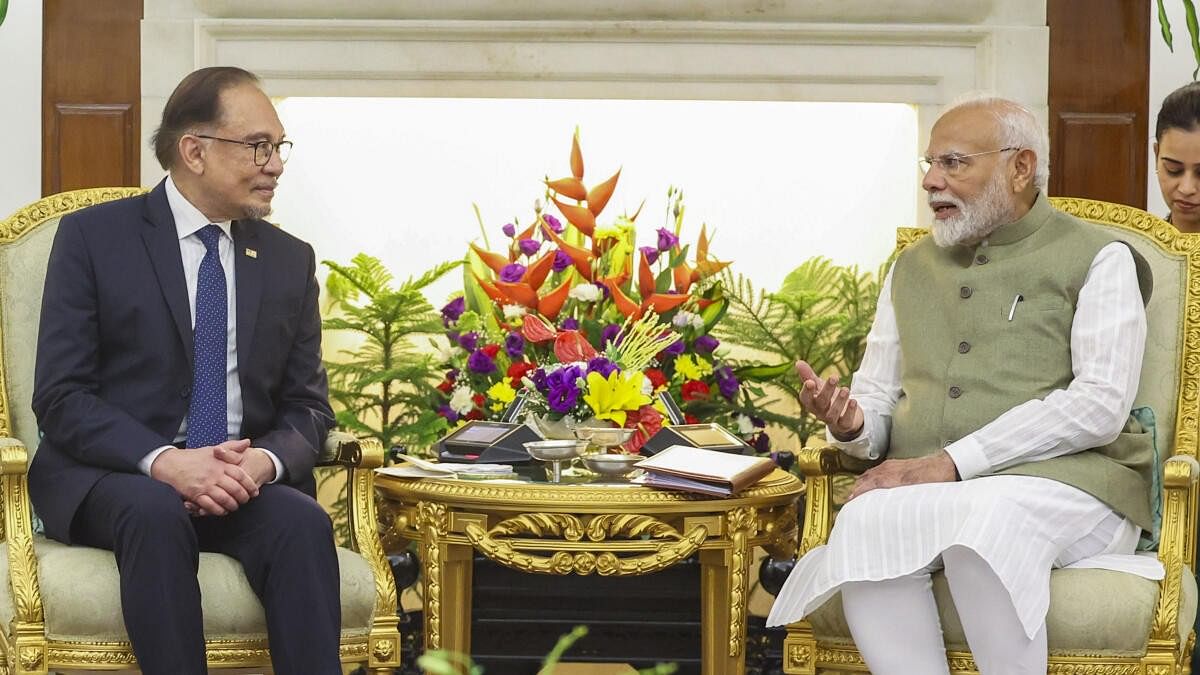
Prime Minister Narendra Modi with his Malaysian counterpart Anwar Ibrahim during a meeting, at Hyderabad House, in New Delhi, Tuesday, Aug. 20, 2024.
Credit: PTI Photo
With a more pragmatic Malaysia honing its middle power ambitions, its relationship with India moved on to the path of a mutually beneficial reset as Prime Minister Narendra Modi met his Malaysian counterpart Anwar Ibrahim in New Delhi to lay out a new vision for the future.
Two years into this current stint as the Prime Minister of Malaysia, Ibrahim has set in motion a slew of measures that could either mitigate or remedy the unease his predecessor Mahathir Mohamad created for the bilateral ties with India, mostly with his seemingly intemperate remarks.
Mohamad’s remarks on the Citizenship Amendment Act (CAA), and the abrogation of Jammu & Kashmir’s special status led to a major diplomatic row between the two countries, and ties started souring in 2019.
New Delhi had termed the Malaysian leader’s assertions as both unsavoury and interfering in its internal affairs. Malaysia’s shrill response to India’s demand to extradite the controversial Islamic preacher, a fugitive from Indian law — Zakir Naik — further strained the ties. Naik’s issue is not yet solved, and is unlikely to soon.
However, the position of the Malaysian government on the issue is now tempered with pragmatism and realism. Ibrahim said if “evidence is submitted” terrorism “will not be condoned” while answering questions about the extradition of Naik.
For the past two years, both nations could effectively move away from the diplomatic quagmire of one major issue or other holding the bilateral relationship between India and Malaysia, home to three million people of Indian heritage, to ransom.
Slowly, the punitive actions such as India, the world’s top buyer of edible oil, banning the import of palm oil from Malaysia got reversed. Malaysia is the second biggest producer of palm oil in the world; the first being Indonesia.
As the relationship moved onto a positive trajectory, Malaysia also invested $5 billion in India in the past year, and listed semiconductors, financial technology, the defence industry and artificial intelligence as areas of greater co-operation. Thus, things got moving steadily.
Ibrahim has made the right choices of words and gestures during his three-day visit to India that concluded on Wednesday. He referred to Modi as “mere dost” (my friend) and “my brother”, saying the friendship between the two leaders had facilitated frank and “no holds barred” discussions on many matters, including sensitive issues. “With the support of Prime Minister Anwar Ibrahim, there has been a new momentum and energy in our partnership,” Modi said.
On another occasion on the same trip, the 77-year-old visiting leader spoke about his meeting with late Prime Minister Indira Gandhi when he was a student leader besides talking about the historic role India always played as the leader of Global South.
Striking the right chord of optics, the two countries look to build on the relationship by boosting trade, using the local currency settlements, the easy facilitating of workers’ movements, and focusing on emerging and critical technology.
Malaysia’s middle power ambitions are truly shining under Ibrahim. Malaysia wants to join the BRICS, the grouping that includes China, India and Russia, which raises questions about the West-dominated world order.
Despite the prickly issue of the South China Sea dispute in the region, Malaysia has always played it tactfully with China. Ibrahim who visited China twice last year, maintained that China is “too strategic and too important” to ignore.
As the ASEAN chair for 2025, Malaysia also looks at imparting new energy to the regional framework, where India is an important dialogue partner. Ibrahim’s efforts to make Malaysia count as a consequential middle power and an important player in what seems like an inexorable regionalisation of international politics is beneficial to India.
(Jayanth Jacob, a foreign policy commentator, has covered the Ministry of External Affairs for over two decades. X: @jayanthjacob.)
Disclaimer: The views expressed above are the author's own. They do not necessarily reflect the views of DH.